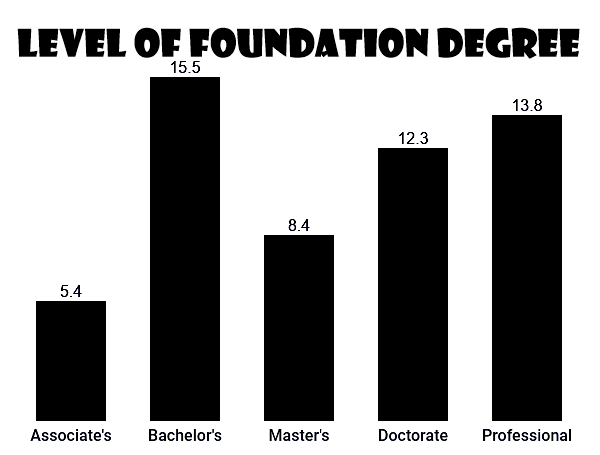How can I benefit from a foundation degree, and what is it?

Formal education and academic studies are vital, but so is your job and profession. If you’re reading this, you might be considering going to school but want to make sure you have a job after you finish. Alternatively, perhaps you currently hold a job and wish to advance your career by strengthening your skill set. Find out if getting a foundation degree is the best choice for you by reading on.
What is a foundation degree?
Essentially, a foundation degree is a vocational degree. It is intended to provide you with specialized knowledge for a given industry or vocation. Universities frequently collaborate with professional associations to provide courses that are specifically targeted to build skills that companies are currently seeking.
Foundation degrees, akin to traditional vocational qualifications such as an NVQ, can integrate classroom or online academic instruction with work experience in an occupational environment. There are foundation degrees to suit every need, whether you’re a trainee or an established professional hoping to boost your chances of getting promoted.

You can continue to make money from your regular job while pursuing a foundation degree part-time. As an alternative, you can pursue a foundation degree full-time, earn the necessary credentials, and then enter your chosen sector equipped with the necessary training, expertise, and certification. Your degree program will be structured to provide you with the knowledge and abilities you need to succeed in the profession. Online degrees can be your best bet if you’re seeking for a flexible way to earn a foundation degree.
You could also be able to turn a foundation degree into a full bachelor’s degree by studying an additional year, depending on the university you attend.
Under the UK’s education qualifications system, a foundation degree is Level 5. A higher national diploma (HND) and an undergraduate degree are both at the same level, while a higher national certificate (HNC) is one level above and below. To put things in perspective, a PhD is Level 8, the highest degree, and GCSEs are Level 1. A Levels are Level 3.Take a look at our post on what an undergraduate degree is to learn more about them.

The two-year foundation degree is effectively two-thirds of an undergraduate degree because it may be transformed into an undergraduate degree by adding a third year. 240 credits are awarded, as opposed to 360 credits for a complete undergraduate degree.
Read More:An undergraduate degree: what is it?
How long is a foundation degree?
The typical duration of a full-time foundation degree is two years. Courses taken part-time often require three or four years to complete. Block release is one of the many flexible learning methods available.
If you are not employed and would like to complete your academic credentials faster than you would an undergraduate degree, full-time courses are a good option. People who want to learn while working a full-time job can enroll in part-time courses.
What’s the difference between a foundation degree and undergraduate degree?
The duration of an undergraduate degree is longer than that of a foundation degree. Unless you enroll in an accelerated course (which is more expensive and rigorous), they require a minimum of three years. Certain undergraduate programs require four to six years to complete (medical programs or studies in Scotland, for example).
Undergraduate courses typically feature experiential learning. Five days a week, on average, you will have lectures and seminars (small group sessions), turn in essays, and take tests at the end of the year. Academic studies will be the main focus; you will learn about theories and concepts, and your tutors will assist you in analyzing and comprehending them from an intellectual standpoint.
Although foundation degrees do involve some academic coursework, their main goal is to provide more than simply theoretical knowledge. Additionally, you’ll pick up useful skills for a career in the workforce.
The majority of universities will allow you to pursue a third year of study to turn your two-year foundation degree into a full degree, also known as an undergraduate, bachelor’s, honours, or BA degree, if you determine thereafter that you truly enjoy learning.
How much does a foundation degree cost?
Foundation degree costs will vary throughout universities, and the cost of a course will depend on the topic of study. The range of tuition costs for an academic year will be between around £2,500 at the low end and £6,500 at the high end. Multiply that by two to get the entire price.

Student loans, grants, and other financial aid are available to assist with the expense of education, much like for undergraduate degrees. It’s worthwhile to inquire about financial help for your studies if you are employed and believe that pursuing your education would improve your work performance and add value to your employer.
Choosing a foundation degree
We advise that you have a clear concept of your career goals before choosing which foundation degree to pursue. For example, you wouldn’t enroll in an agriculture course if your goal is to become a hotel manager.We advise that you have a clear concept of your career goals before choosing which foundation degree to pursue. For example, you wouldn’t enroll in an agriculture course if your goal is to become a hotel manager. You will gain knowledge about farming and crop production, for sure, but only if you intend to work in the agricultural industry. You must major in hospitality, leisure, or tourism if you wish to work as a hotel manager. Yes, you will discover this cultivation of crops and farming, however that’s only relevant if you wish to work in the agricultural industry. You must major in hospitality, leisure, or tourism if you wish to work as a hotel manager.
These are just a few areas where possibilities for foundation degrees are available.:
- degrees in business
- degrees in computer science and IT
- degrees in construction
- degrees in teaching
- degrees in engineering
- degrees in healthcare
- degrees in nursing
How to apply for a foundation degree
When applying for a foundation degree, you should first make sure the program you choose will help you achieve your professional and academic objectives. Verify the prerequisites for admission to the selected program and compile the required paperwork, including recommendation letters, academic transcripts, and a personal statement. Find the application form on the foundation degree provider’s official website, fill it out carefully, and make sure all the information is correct. Make sure you have included all the supporting documentation, and pay the application cost if it applies. Please remember to include any needs for an interview in your application and submit it by the deadline. Wait patiently for the admissions decision after submitting.In the event that the offer is approved, carefully adhere to the guidelines to formally accept it and begin the program. If available, take advantage of orientation programs and think about your accommodation and financial assistance needs. Finally, start your foundation degree courses and set out on your academic path. It’s crucial to remember that different application procedures may apply, so make sure you adhere to the instructions given by the organization.












One Comment